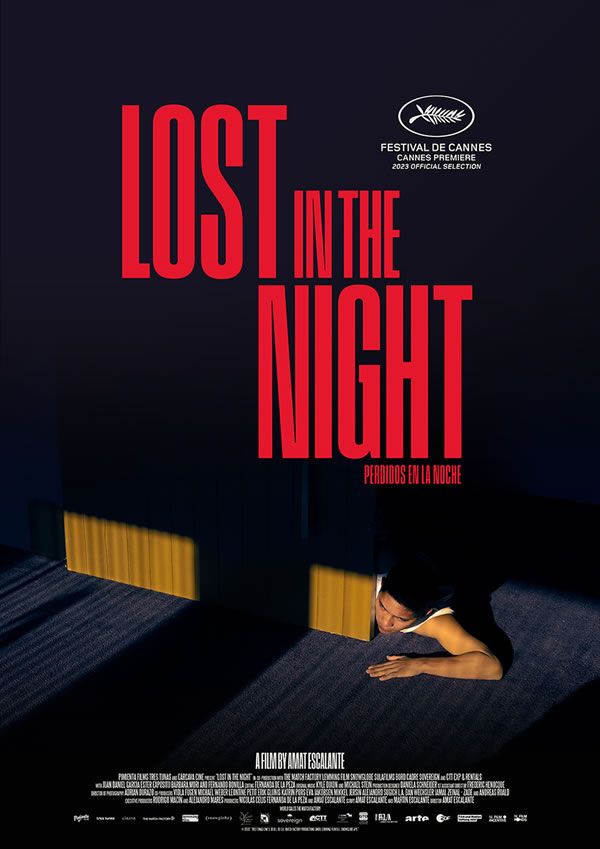08/11/2023
Review 'Lost in the Night': Amat Escalante's New Paths to Reach a Wider Audience
By Daniel Ruiz (Twitter: @tatoruiz), accredited by CineVista at the Lima Film Festival
The latest from Amat Escalante, perhaps one of the most celebrated directors in the region, includes situations such as the prolonged forced disappearance of a female activist, corruption at the hands of the police, and sex as a currency of exchange and a synonym for authentic dominance over the other. It also includes the inevitable presence of social media and its influence on everyday lives, as well as some rather strange pursuits in which its protagonist, Juan Daniel García Treviño ("I'm No Longer Here" 2019), is capable of becoming a sort of Latin American Tom Cruise.
"Lost in the Night," which had its world premiere at the recent Cannes edition (Cannes Premiere), presents the themes that obsess Escalante in a career that, if one were to abbreviate its common themes, would be about knowing how to tell a story of all forms of violence in Mexico. Here, the story of Emiliano (García Treviño), a young man who is seeking those responsible for the disappearance of his mother, a teacher and activist who, three years ago, openly opposed the local mining industry, is told.

The film begins precisely three years before the present that is narrated. The woman, disliked by those leading the mining industry and the townspeople, is pursued and violated in an ambush carried out by members of the police. Returning to the present, Emiliano comes across a clue – a rather gratuitous and implausible sequence, if we adhere to the realistic universe portrayed in the film – that leads him to meet an eccentric family of celebrities and artists, who surprisingly offer him work and, therefore, the opportunity to discover what these people have to do with his mother's disappearance. People, by the way, who at first glance wouldn't raise any caution – but rather perspicacity – if considered.

"Lost in the Night" not only marks the director's return to Cannes, whose previous film "The Untamed" premiered worldwide in Venice. It also constitutes his first film with professional actors. The members of the peculiar family around which all doubts revolve are portrayed by Mexican actress Bárbara Mori (famous for the soap opera "Rubí"), Spanish actress Estér Expósito ("Elite"), and Fernando Bonilla, whose career has also developed in Mexican television, in addition to belonging to a family that has made a name for itself in the entertainment world. On the side of the protagonist, Escalante chose Juan Daniel Treviño García, who already has some experience in cinema and gained recognition with his debut in Fernando Frías' film, a movie that was available on Netflix during the year of the pandemic. Treviño is one of those actors whose presence exudes a certain threat and unease, precisely two sensations that this character conveys given his context as a victim. And undoubtedly, it's the most convincing performance in the film.

The presentation of this cast might be the first clue to Escalante's new intentions: to reach a broad audience hungry for entertainment and action (perhaps also for scripts not necessarily very plausible?), and a touch of curiosity and explicitness in terms of the representation of eroticism or sexuality. "Lost in the Night" is a film in which veracity is not necessarily tied to the twists of the script, even in a film whose atmosphere limits realism. Its plot twists and the inherent tension of the narrative respond to an exclusive need to advance the story at all costs. Without the need to pause and think if it truly aligns with the possible motivations and realities of its characters and all the decisions they have made in the lives they portray here.
Despite the aforementioned, which at least for me makes this film have an erratic journey (and an imprint reminiscent of the most soap-opera-like melodramas), Escalante offers a very contemporary and valuable reflection that goes beyond the criminal conflict in Mexico. He revisits how artificial the social commitment of certain personalities is, whose needs for popularity and celebrity lead them to cross the boundaries of morality and ethics.

Within the portrayed family, there is a heap of struggles to remain present in the public eye through the prostitution of the art world and the easy access provided by social media and mobile cameras. Similarly, the ease with which money leads to corruption and a superficial interpretation of enormous present conflicts. For instance, the character played by Expósito frequently performs representations of suicide that truly create, at the very least, some discomfort.
Perhaps designed, as previously mentioned, for a broad audience, perhaps for platforms like streaming services, it's very difficult to remain indifferent to it. In any case, we are facing the most uneven work of a director who has built a career through quite genuine forms in relation to what he chooses to tell and how to tell it.
Technical Details
-
Director: Amat Escalante
-
Screenplay: Amat Escalante
-
Genre: Suspense, Drama
-
Duration: 120 minutes
-
Screenplay: Amat Escalante, Martín Escalante, Paulina Mendoza
-
Producers: Nicolás Celis, Amat Escalante, Fernanda de la Peza
-
Cast: Juan Daniel García Treviño, Ester Expósito, Bárbara Mori, Fernando Bonilla, Alfozo Zamacona, María Fernanda Osio, Mayra Hermosillo, Vicky Araico, Jero Medina
-
Music: Kyke Dixon, Miguel Steinberg
-
Cinematography: Adrián Durazo
-
Editing: Fernanda de la Peza
-
Countries: Mexico, Germany, Denmark, Netherlands
-
Year: 2023
Other Publications Covering Lima Film Festival
Image Credit: Pimienta Films
<< Go to Spanish version
